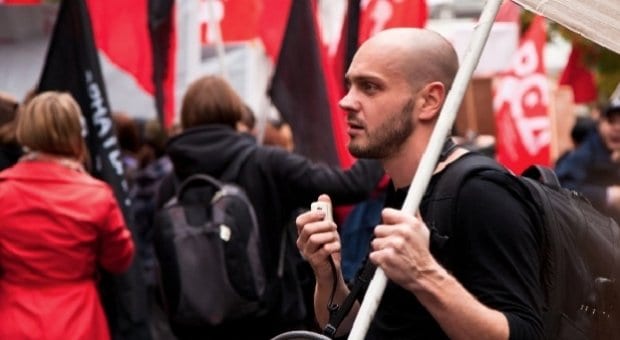Not long after Russian President Vladimir Putin signed a bill banning “gay propaganda” in June, Stanislav Petrov says, most of his friends were at one of Moscow’s gay clubs, dancing the night away and taking in a drag show.
According to Petrov, a 27-year-old public relations advisor who lives in Moscow, recent laws have not had an impact on his personal life. “Russia was always homophobic,” he says. “The law has changed nothing for me and for most of my peers. We always had to hide.”
For Petrov, while Russia’s laws do pose a threat, he is more concerned about the next generation. “When I was a teenager, I did not know a lot about gay people. But I read newspapers and watched films where I could access information. I listened to tATu,” he says, referring to the Russian pop duo that consists of Lena Katina and Yulia Volkova. “Today, teens can only get negative information about homosexuality and transsexuality. If a teen self-identifies as gay and everyone around him says it is a perversion and a disease, how can this teen continue to live?”
Others, whose involvement in activism places them closer to the line of fire, are more concerned. “I live in a state where there is constant danger; it is just a question of degree,” says Gulya Sultanova, director of Side by Side, St Petersburg’s LBGT film festival. “Those who made the law want to use it, so it is very hard for organizations like ours to survive. Everyone is afraid of the laws and of the government’s reaction to working with us.”
Side by Side 2013, held last November, received five bomb threats over its 10-day run. “We lost two of our four venues,” Sultanova says. “But we found alternatives, and the festival was a success.” She adds that, despite the circumstances, the festival was well attended and preparations are underway for the 2014 festival. Several smaller events, including a screening of Valentine Road followed by a discussion on bullying and hate speech, scheduled to take place on Feb 15, will proceed.
For Igor Yasine, a Moscow journalist who organizes events and protests for the Rainbow Association, there is light at the end of the tunnel. “There are problems, and they have got worse in recent times,” he says. “But I think that Western media exaggerates this perspective and does not show the full picture of what is happening. They do not speak about all of the events that have gone on in Moscow and in St Petersburg and about all of the positive attention they have generated from the media.”
The Rainbow Association — which provides support and services to LGBT community members and organizes public actions, including protests and educational events — has been working closely with local media.
“Until recently, Russian media never spoke about the LGBT community in so much depth,” Yasine says. “Because of controversy around the laws, there is a serious discussion going on, and activists finally have an opportunity to express their point of view.”
Both Sultanova and Yasine are committed to remaining in Russia and continuing their fight for LGBT rights. “I know that I can go to another country and things will be easier,” Sultanova says. “But that is my last resort. I want to change the maximum of what I can here.”
“If you want to support the LGBT community, you cannot boycott the country,” Yasine says. “That isolates the LGBT community here. Both local and international support is important for the fight to be effective.”
“The situation is difficult because current legislation leaves us almost no room for dialogue,” Sultanova says. “But there is still space for change to happen. We need solidarity and support from our allies abroad to make this a reality.”
Dinah Zeldin is a freelance reporter based in St Petersburg, Russia. She covers human rights and environmental issues.

 Why you can trust Xtra
Why you can trust Xtra


